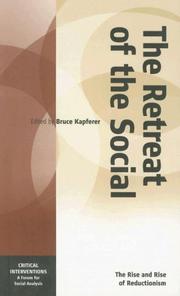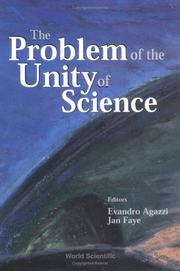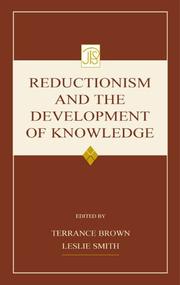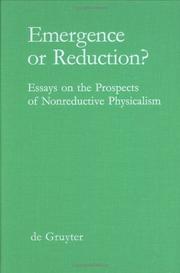| Listing 1 - 10 of 55 | << page >> |
Sort by
|
Book
ISBN: 9783110329513 3110329514 9783868380569 9783110329360 129972180X 3110329360 Year: 2009 Publisher: Frankfurt : Ontos Verlag,
Abstract | Keywords | Export | Availability | Bookmark
 Loading...
Loading...Choose an application
- Reference Manager
- EndNote
- RefWorks (Direct export to RefWorks)
Mit dem Begriff der Theoriennachbarschaft und einer darauf aufbauenden neuen Definition von Reduktion ermöglicht diese Arbeit eine angemessene Beschreibung und Einteilung der vielen diffizilen Beziehungen zwischen physikalischen Theorien. Mithilfe dieser Konzepte wird in drei Fallstudien exemplarisch gezeigt, dass moderne physikalische Theorien zwar meist benachbart zueinander sind, aber nicht so aufeinander reduzierbar, dass eine reduzierte Theorie für die wissenschaftliche Beschreibung der Welt entbehrlich wäre. Die Einheit der Physik kann daher nicht auf eliminativen Reduktionen auf fundame
Reductionism. --- Physics --- Philosophy --- Philosophy.

ISBN: 1845451759 1782387196 9781845451752 9781782387190 Year: 2009 Publisher: New York, [New York] ; Oxford, [England] : Berghahn Books,
Abstract | Keywords | Export | Availability | Bookmark
 Loading...
Loading...Choose an application
- Reference Manager
- EndNote
- RefWorks (Direct export to RefWorks)
The powerful individualist and subjectivist turn in anthropology - a turn that cannot be easily separated from larger political processes of neo-liberalism and neo-conservatism - is one factor resulting in notions of the social and of society as becoming little else than empty shells of small or no analytical value. The essays presented here, all by leading anthropologists, take a variety of positions on the matter of the retreat of the social. All demonstrate that if anthropology and other social sciences are to fulfill the task of a critical understanding of the diverse realities in which we all must live, these disciplines will find it impossible to so do without a strong concept of the social.
Reductionism. --- Anthropology --- Philosophy.

ISBN: 1281948373 9786611948375 9812799591 9789812799593 9810247915 9789810247911 9789810247911 9810247915 9781281948373 Year: 2001 Publisher: River Edge, NJ : World Scientific,
Abstract | Keywords | Export | Availability | Bookmark
 Loading...
Loading...Choose an application
- Reference Manager
- EndNote
- RefWorks (Direct export to RefWorks)
The unity of science has been a widely discussed issue both in the philosophy of science and within several sciences. Reductionism has often been seen as the means of bringing the different sciences to a fundamental unity by reference to some basic science, but it shows many limitations. Multidisciplinarity and interdisciplinarity have also been proposed as methodologies for attaining unity without underestimating the diversity of the sciences. This volume starts with a clarification of the possible meanings of this unity and then discusses the features of the mentioned approaches to unity, evaluating the success and the shortcomings of the unification programme among different sciences and within a single science.
Reductionism --- Science --- Philosophy --- Reductionism - Congresses. --- Science - Philosophy - Congresses.

ISBN: 1135639892 1282321900 9786612321900 1410606953 9781410606952 0805840699 9781135639891 9781135639846 1135639841 9781135639884 1135639884 9780805840698 0805840699 9780415651387 0415651387 9781282321908 6612321903 Year: 2003 Publisher: Mahwah, N.J. : L. Erlbaum,
Abstract | Keywords | Export | Availability | Bookmark
 Loading...
Loading...Choose an application
- Reference Manager
- EndNote
- RefWorks (Direct export to RefWorks)
Among the many conceits of modern thought is the idea that philosophy, tainted as it is by subjective evaluation, is a shaky guide for human affairs. People, it is argued, are better off if they base their conduct either on know-how with its pragmatic criterion of truth (i.e., possibility) or on science with its universal criterion of rational necessity.Since Helmholtz, there has been increasing concern in the life sciences about the role of reductionism in the construction of knowledge. Is psychophysics really possible? Are biological phenomena just the deducible results of chemical
Cognition --- Knowledge, Theory of --- Reductionism --- Philosophy
Book
ISBN: 311032332X 9783110323320 3110322870 9783110322873 9783110322873 1299724027 Year: 2013 Publisher: Frankfurt : Ontos Verlag,
Abstract | Keywords | Export | Availability | Bookmark
 Loading...
Loading...Choose an application
- Reference Manager
- EndNote
- RefWorks (Direct export to RefWorks)
In contemporary philosophy of science, ontological reductionism, or the claim that everything that exists in the world is something physical, is the consensus mainstream position. Contrary to a widespread belief, this book establishes that ontological and epistemological reductionism stand or fall together. The author proposes a new strategy of conservative theory reduction that operates by means of the construction of functional sub-concepts that are coextensional with physical concepts. Thus, a complete conservative reductionism is established that vindicates both the indispensable scientific character of the special sciences and their reducibility to physics. The second part of the book works this strategy out, using the example of classical and molecular genetics.
Reductionism. --- Science --- Normal science --- Philosophy of science --- Philosophy --- Philosophy. --- Metaphysics

ISBN: 3110128802 3110870088 9783110870084 9783110128802 Year: 1992 Publisher: Berlin ; New York : W. de Gruyter,
Abstract | Keywords | Export | Availability | Bookmark
 Loading...
Loading...Choose an application
- Reference Manager
- EndNote
- RefWorks (Direct export to RefWorks)
-Reductionism --- Logical positivism --- Reductionism --- Congresses. --- Philosophy --- Logical empiricism --- Neo-empiricism --- Neo-positivism --- Physicalism --- Positivism, Logical --- Unity of science movement --- Language and logic --- Logic --- Meaning (Psychology) --- Positivism --- Relationism --- Science --- Analysis (Philosophy) --- Verification (Empiricism) --- Vienna circle --- Congresses --- Logical positivism - Congresses. --- Reductionism - Congresses.
Book
ISBN: 3110328577 1299723179 3110328879 9783110328875 Year: 2009 Volume: n.s., v. 11 Publisher: Frankfurt : Ontos Verlag,
Abstract | Keywords | Export | Availability | Bookmark
 Loading...
Loading...Choose an application
- Reference Manager
- EndNote
- RefWorks (Direct export to RefWorks)
Philosophers often have tried to either reduce ""disagreeable"" objects or concepts to (more) acceptable objects or concepts. Reduction is regarded attractive by those who subscribe to an ideal of ontological parsimony. But the topic is not just restricted to traditional metaphysics or ontology. In the philosophy of mathematics, abstraction principles, such as Hume''s principle, have been suggested to support a reconstruction of mathematics by logical means only. In the philosophy of language and the philosophy of science, the logical analysis of language has long been regarded to be the domin
Philosophy of mind. --- Reductionism. --- Science -- Philosophy. --- Philosophy --- Philosophy & Religion --- Logic --- Speculative Philosophy --- Reductionism --- Abstraction --- Analysis (Philosophy) --- Abstract thought --- Cognition --- Thought and thinking
Book
ISBN: 3030921913 3030921921 9783030921910 Year: 2022 Publisher: Cham, Switzerland : Springer,
Abstract | Keywords | Export | Availability | Bookmark
 Loading...
Loading...Choose an application
- Reference Manager
- EndNote
- RefWorks (Direct export to RefWorks)
Holism. --- Philosophy and science. --- Reductionism. --- Philosophy --- Science and philosophy --- Science --- Wholism --- Evolution --- Whole and parts (Philosophy)
Book
Year: 2014 Publisher: Frontiers Media SA
Abstract | Keywords | Export | Availability | Bookmark
 Loading...
Loading...Choose an application
- Reference Manager
- EndNote
- RefWorks (Direct export to RefWorks)
There has been an ongoing debate about the capabilities and limits of the bio-natural sciences as sources and the methodological measure in the philosophy of psychiatry for quite some time now. Still, many problems remain unsolved, at least partly for the following reasons: The opposing parties do not tend to speak with each other, exchange their arguments and try to increase mutual understanding. Rather, one gets the impression that they often remain in their “trenches”, busy with confirming each others' opinions and developing their positions in isolation. This leads to several shortcomings: (1) Good arguments and insights from both sides of the debate get less attention they deserve. (2) The further improvement of each position becomes harder without criticism, genuinely motivated by the opposing standpoint. (3) The debate is not going to stop, at least not in the way it would finish after a suggested solution finds broad support; (4) Related to this, insisting on the ultimate aptnessof one side is just plainly wrong in almost every case. Since undeniably, most philosophical positions usually have a grain of truth hidden in them. In sum, many controversies persist with regard to the appropriate methodological, epistemological, and even ontological level for psychiatric explanation and therapies. In a conference which took place in December last year, we tried to contribute to a better understanding about what really is at issue in the philosophy of psychiatry. We asked for a common basis for several sides, for points of divergence and for the practical impact of different solutions on everyday work in psychiatry. Since psychiatry as a whole is a subject that is to wide to be covered in a single meeting, we focused on the following four core topics: 1. Competing accounts of psychiatric biologism, reductionism, and physicalism. 2. Mental disease and brain disease in the light of current neuroscientific and epigenetic findings. 3. Normative suppositions for different accounts of mental disease. 4. Normative implications of different accounts of mental disease. These topics, which have been vigorously as well as fruitfully discussed at our conference, will (ideally) be, too, in the center of our contribution to Frontiers. More precisely, we think of arranging a “research topic” which assembles the issues of the conference. At this point, it seems promising to us to group three or four Target Articles (TA) and let them get criticized by a couple of commentaries from different angles to give the issue a much broader and detailed perspective.
Psychobiology. --- Biological psychiatry. --- Ethics --- medical --- Philosophy of Neuroscience --- biologism in psychiatry --- Reductionism --- Psychiatry
Book
ISBN: 3319253085 3319253107 Year: 2015 Publisher: Cham : Springer International Publishing : Imprint: Springer,
Abstract | Keywords | Export | Availability | Bookmark
 Loading...
Loading...Choose an application
- Reference Manager
- EndNote
- RefWorks (Direct export to RefWorks)
This book develops a philosophical account that reveals the major characteristics that make an explanation in the life sciences reductive and distinguish them from non-reductive explanations. Understanding what reductive explanations are enables one to assess the conditions under which reductive explanations are adequate and thus enhances debates about explanatory reductionism. The account of reductive explanation presented in this book has three major characteristics. First, it emerges from a critical reconstruction of the explanatory practice of the life sciences itself. Second, the account is monistic since it specifies one set of criteria that apply to explanations in the life sciences in general. Finally, the account is ontic in that it traces the reductivity of an explanation back to certain relations that exist between objects in the world (such as part-whole relations and level relations), rather than to the logical relations between sentences. Beginning with a disclosure of the meta-philosophical assumptions that underlie the author’s analysis of reductive explanation, the book leads into the debate about reduction(ism) in the philosophy of biology and continues with a discussion on the two perspectives on explanatory reduction that have been proposed in the philosophy of biology so far. The author scrutinizes how the issue of reduction becomes entangled with explanation and analyzes two concepts, the concept of a biological part and the concept of a level of organization. The results of these five chapters constitute the ground on which the author bases her final chapter, developing her ontic account of reductive explanation.
Reductionism. --- Biology --- Philosophy. --- Philosophy and science. --- Philosophy of Science. --- Philosophy --- Vitalism --- Science --- Normal science --- Philosophy of science --- Science and philosophy
| Listing 1 - 10 of 55 | << page >> |
Sort by
|

 Search
Search Feedback
Feedback About UniCat
About UniCat  Help
Help News
News